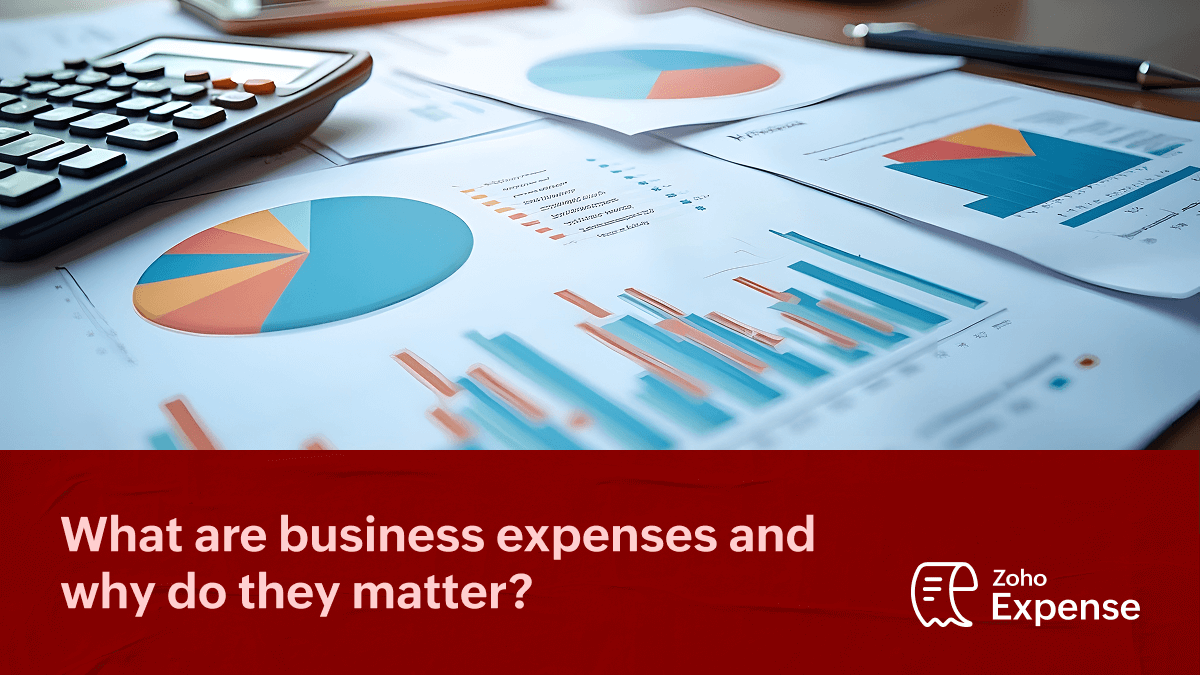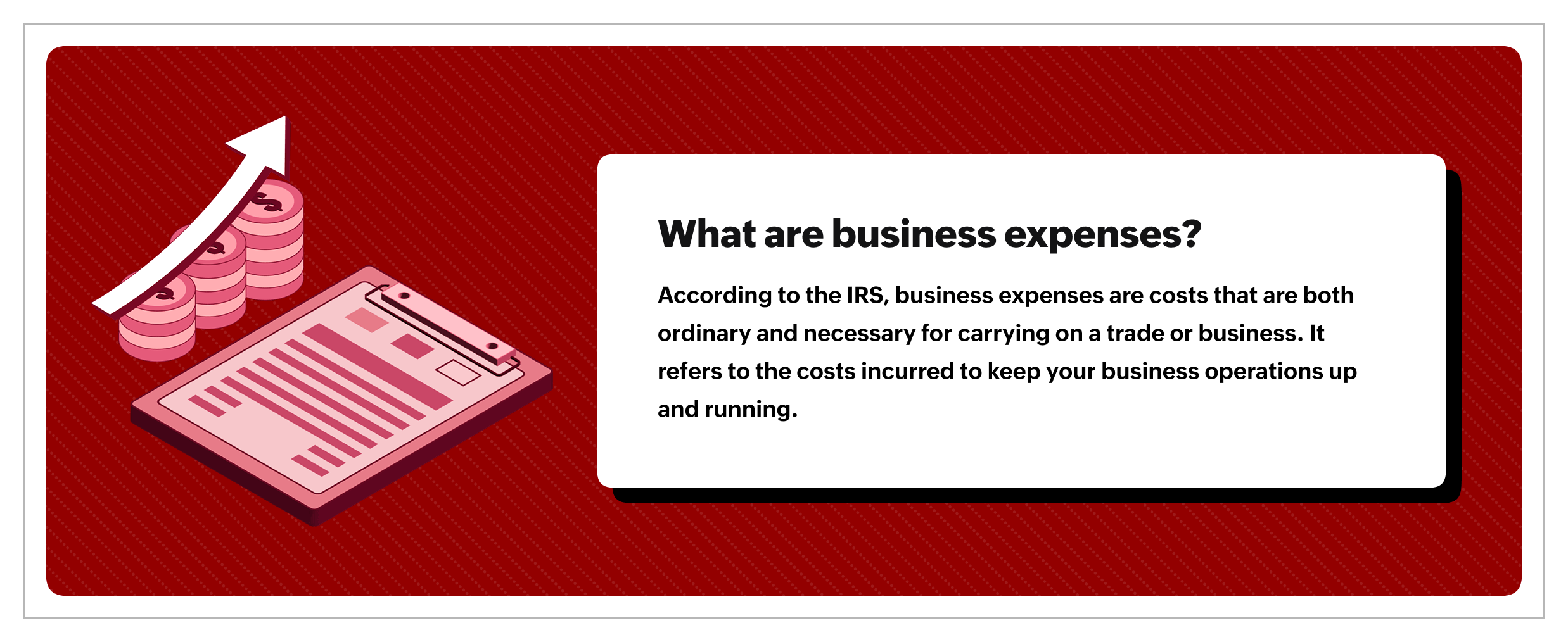- HOME
- Expense Management
- What are business expenses and why do they matter to your business? IRS Guidelines 2025, expense management tips and tax deductions
What are business expenses and why do they matter to your business? IRS Guidelines 2025, expense management tips and tax deductions
Have you ever wondered why some companies manage to keep their tax bills optimized year after year, while others find themselves overpaying or risking penalties? The answer often lies in their understanding of business expenses. Understanding what business expenses are isn’t just for accountants and tax preparers; it is the fundamental knowledge for every entrepreneur, business owner, or finance professional aiming to run a profitable and compliant business.

This comprehensive guide breaks down what business expenses are under the IRS guidelines, what types of expenses qualify, how to manage them efficiently, and the strategies that can turn expense tracking into a strategic advantage for your organization.
What are business expenses?
At its core, a business expense refers to the costs you incur to keep your operations running. These are not just mere numbers on your general ledger; they portray how your business operates day to day.

From office rent to software subscriptions, every dollar spent must be accounted for correctly. To file taxes and claim deductions, you should be able to identify, document, and categorize these expenses. It can help you significantly reduce your taxable income, freeing up funds to reinvest in growth or simply keep your business financially resilient.
What is the IRS's definition of business expenses?
To understand what is considered a business expense, you must first look at how the IRS defines them under Section 162(a) of the Internal Revenue Code. According to this provision, business expenses are costs that are both ordinary and necessary for carrying on a trade or business. But what does "ordinary" and "necessary" actually mean?
When the IRS uses the word “ordinary,” it refers to expenses that are common and accepted in your specific trade or industry. For example, for a freelance graphic designer, paying monthly fees for design software is ordinary because it's a standard tool of their trade. For a manufacturing business, costs of raw materials would be ordinary expenses.
On the other hand, “necessary” doesn't mean indispensable expense, but indicates that the expense is helpful and appropriate for your business operations. For example, if you are renting a co-working space to work productively instead of working from home, it may not be considered an essential business expense. However, if this enhances your productivity, thus contributing to the growth of your business, then it qualifies as a necessary expense.
Understanding the underlying concept and differences between ordinary and necessary business expenses is crucial. It forms the backbone of business expenses that you can deduct from your taxable income. Misunderstanding it could lead to disallowed deductions or, worse, penalties during an audit.
What is considered a business expense?
Business expenses can cover a wide range of costs incurred in your operations. To truly understand what business expenses are in practical terms, it helps to explore the types of expenditures most businesses incur and how the IRS views them.
What is an operating expense?
Operating expenses form the core of what business expenses are in day-to-day operations. These include your rent or lease payments for office space, utility bills, internet charges, phone services, office supplies, insurance premiums, and software subscriptions. If you’re running a consulting firm, your project management tools, CRM software, and communication apps fall under operating expenses. These are the bread and butter of your expense business structure, supporting your daily workflows.
What is payroll expense?
Payroll is often the largest expense for businesses, especially in service sectors. It includes salaries, wages, bonuses, commissions, and employer-paid taxes like Social Security and Medicare contributions. Employee benefits provided by a company, like health insurance and retirement plan contributions, also count as deductible payroll expenses. These costs are considered both ordinary and necessary, as they directly relate to the delivery of your products or services.
What are travel and meal expenses for a business?
Business travel expenses are fully deductible if the primary purpose of the trip is for business. This includes airfare, lodging, rental cars, and other travel-related costs.
However, meals while traveling or with clients are only 50% deductible under current IRS rules, provided they are not lavish or extravagant. Taking a client out to lunch to discuss a project would qualify, whereas an expensive wine-tasting dinner without a business agenda likely would not.
Check out Business Mileage Reimbursement 2025: A complete guide to updated IRS rates, rules, and best practices to learn more.
What is a home office expense?
If you use part of your home regularly and exclusively for business purposes, then you can claim a home office deduction. The IRS allows two methods:
- The simplified method is where you deduct $5 for every square foot. The maximum is up to 300 square feet.
- The regular method, where you calculate the actual expenses based on the percentage of your home that is being used for business. This deduction often benefits freelancers, consultants, and small business owners who operate out of a home workspace.
What is depreciation in business expenses?
Depreciation helps a business recover the cost of tangible assets that have a useful life beyond one year, such as machinery, vehicles, and computers. Instead of deducting the full cost in the year of purchase, you spread it over the asset’s useful life under the IRS’s Modified Accelerated Cost Recovery System (MACRS). Alternatively, Section 179 permits immediate expensing of qualified property up to annual limits, which is beneficial for businesses looking to reduce taxable income swiftly while investing in assets.
Understanding each of these categories ensures you maximize your deductions within legal boundaries while keeping your finances structured and clear.
What are IRS rules and limitations on business expenses?
While the IRS allows deductions for ordinary and necessary expenses, certain rules and limitations govern how and when these deductions apply.
Check out IRS Publication 535: A strategic guide to maximize tax savings and manage business expenses to learn more.
What is the difference between capital expenditures and deductible expenses?
Capital expenditures refer to costs that provide a benefit extending beyond the current tax year. When you purchase long-term assets such as buildings, vehicles, machinery, or heavy equipment, these are considered capital expenditures. The IRS requires these costs to be capitalized, meaning they are recorded as assets in your balance sheet and depreciated over their useful lifetime rather than deducted fully in the year of purchase. For example, if you buy a delivery truck for your business, its cost will be spread out as depreciation deductions over several years, reflecting its gradual use and wear.
In contrast, deductible expenses, often called operating or current expenses, are costs that are ordinary and necessary for your day-to-day business operations and are used up within the same tax year. These include items such as office rent, utility bills, employee salaries, insurance premiums, travel expenses, and software subscriptions. Since these expenses are directly tied to running your business in the current year, they can be fully deducted from your gross income in the year they are incurred, thus helping reduce your taxable income for that period.
Recognizing whether a cost is a capital expenditure or a deductible expense helps you report expenses correctly, maximize allowable deductions, and plan your cash flow effectively without risking misclassification that could trigger IRS scrutiny.
What are IRS restrictions on entertainment expenses?
Under the Tax Cuts and Jobs Act, the IRS significantly limited deductions for entertainment expenses. While meals directly related to business remain 50% deductible, expenses for entertainment, amusement, or recreation activities are generally non-deductible. For instance, taking a client to a sporting event or theater show would not qualify for a deduction, even if business was discussed during the event. This change necessitates careful categorization and record-keeping to ensure compliance.
What is the Hobby Loss rule?
Another critical IRS rule is the hobby loss limitation under IRC §183. If your business consistently operates at a loss and lacks a clear profit motive, the IRS may reclassify it as a hobby. In such cases, deductions are only allowed up to the amount of income generated from that activity, disallowing any net loss deductions against other income. This rule underscores the importance of treating your venture professionally, maintaining separate business accounts, and demonstrating a genuine intent to make a profit.
What is the best way to document and record business expenses?
When it comes to managing expenses for a business, proper documentation is non-negotiable. The IRS requires you to substantiate every deduction claimed with appropriate proof. This includes receipts, invoices, bank and credit card statements, mileage logs, and records indicating the business purpose of the expense.
Imagine you’re claiming travel expenses for a conference. You should keep flight itineraries, hotel bills, registration confirmations, and notes indicating the business benefit of attending. If you deduct a meal with a client, your receipt should include details of who was present and the purpose of the meeting.
Maintaining organized records not only prepares you for potential IRS audits but also offers operational clarity. Many businesses face challenges when personal and business expenses are mixed in a single account. This commingling can lead to disallowed deductions or even reclassification of the entire activity as a hobby if audited. To avoid such pitfalls, it is best practice to maintain separate bank accounts and different credit cards to carry out your business related transactions. You can also make use of online expense management tools like Zoho Expense to simplify this process.
What are effective management tips to optimize business expenses?
Understanding what qualifies as a business expense is just the starting point. The real impact comes when you manage these expenses strategically, turning routine cost tracking into a powerful tool for tax efficiency and financial clarity.
- Categorize and record expenses as they occur.
- Understand the timing of your business and use the profits wisely. Make investments or renewals of business requirements when you are profitable rather than waiting for the year to end.
- Review and update your business expenses regularly so you can prevent unnecessary expenses, such as any unused subscriptions that are auto-renewed every year.
- Understand and stay updated on tax laws and yearly amendments, and make sure your finance team is also updated to make the most of eligible deductions.
- Use an automatic expense management system that can integrate with your accounting software and IT stacks to manage business expenses efficiently, maximize tax deductions, and avoid IRS audit triggers. Check out What is expense management software? Benefits and features explained for a better understanding.
How can Zoho Expense help track and manage business expenses?
Zoho Expense helps your company simplify and streamline the complex process of business expense management, ensuring your processes remain efficient, compliant, and employee-friendly. Here’s how it adds value.
- Automated receipt scanning: Employees can snap a photo of receipts on the go using Zoho Expense, and the application will automatically extract and categorize the data instantly, reducing manual errors.
- Real-time expense tracking: Expenses are recorded as they occur, giving finance teams a real-time view of company spending without waiting for month-end reports.
- Policy enforcement built-in: Expense policies are integrated within the system, ensuring claims comply with company rules before they reach approvers.
- Faster approvals and reimbursements: Automated workflows route expense reports to the right people quickly, cutting down approval delays and improving employee satisfaction.
- Seamless integrations: Zoho Expense connects effortlessly with accounting software like Zoho Books, QuickBooks, and Xero, syncing expense data for accurate financial reporting.
- Audit-ready documentation: All receipts and expense records are stored digitally, organized by category and report, making tax filing and audits hassle-free.

Using Zoho Expense transforms expense management from a manual burden into a streamlined process that saves time, improves compliance, and gives you greater control over your business finances.
What is the bottom line on managing business expenses?
Understanding what is a business expense and applying IRS guidelines accurately is not just a tax-saving tool. It reflects disciplined financial management, positions your business for audits confidently, and enables smarter resource reinvestment into initiatives aiding business growth.
It is important for a business owner to know and understand how to differentiate capital expenditures from deductible expenses, maintain meticulous documentation, and time your asset purchases to maximize Section 179 benefits. This small addition to your expense management process will boost your business’s resilience and profitability.
Leveraging automated expense management solutions like Zoho Expense can transform this traditionally tedious process into a strategic advantage. From automated expense tracking and real-time categorization to seamless integration with your accounting systems, Zoho Expense empowers your finance teams to spend less time on manual data entry and more time on analysis, compliance, and strategic planning.
In the end, expenses tell the story of how your business operates. Managing them wisely ensures your story is one of growth, efficiency, and long-term success.
 Anu Sathian
Anu SathianAnu Sathian is a passionate FinTech content writer and a seasoned marketing professional with over 5 years of experience and a robust background spanning diverse industries, including FMCG, SaaS, IT Services, Higher Education, and Corporate and Commercial Travel. As a contributing expert at Zoho Expense Academy, Anu leverages this broad understanding to deliver insights that help businesses optimize their financial operations, with a particular emphasis on business travel, expense management, and corporate spend management. With a deep understanding of the evolving landscape of business spend and a knack for simplifying complex financial topics, Anu's content aims to empower businesses with actionable strategies.

